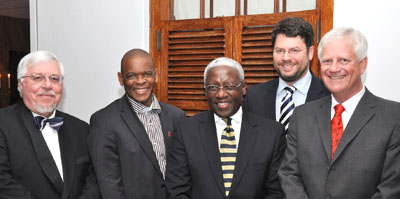Latest News Archive
Please select Category, Year, and then Month to display items
17 June 2020
|
Story Dr WP Wahl

The Division of Student Affairs (DSA) prioritises innovation to meet the challenges of food insecurity and malnutrition among students. To this end, several student volunteers and student governance structures are collaborating with the DSA on various initiatives.
During 2019, various conversations were held about the possibility of creating a health-promoting food environment at the UFS where students and staff are well informed and empowered to take appropriate action regarding their food and nutritional needs. These conversations resulted in an institutional strategy to address the food environment at the UFS. Student representatives serve on a technical committee that directs the implementation of this strategy. In this regard, several initiatives have already been launched.
Students from residences and other student communities have planted vegetable gardens on the Bloemfontein Campus with the assistance of KovsieACT and the Faculty of Natural and Agricultural Sciences. Students and staff are already harvesting and distributing vegetables to needy students every week. Measurements were put in place to continue this during the COVID-19 period. The following vegetables were planted: spinach, cabbage, beetroot, broccoli, cauliflower, and carrots.
Food parcels, donated by Tiger Brands and Gift of the Givers, are continuously handed out by DSA staff and student volunteers. In this regard, 540 food parcels have already been handed out on the Bloemfontein Campus during the COVID-19 period alone. During the same time, 117 students received food parcels on the Qwaqwa Campus. The innovation of this food parcel project rests on the fact that business, NPOs, UFS students, and DSA staff are collaborating to address food insecurity and malnutrition.
More collaborative initiatives will be implemented over the next 12 months. The DSA staff and students are already working with the Department of Dietetics and Consumer Sciences to create information packages about the preparation of low-budget nutritious meals.
Related article:
Vegetable tunnels established to continue the fight against food insecurity
UFS informs judicial officers about human trafficking
2010-08-11
 |
At the conference on human trafficking for judicial officers were, from the left: Prof. Johan Henning, Dean of the Faculty of Law at the UFS; Mr Ace Magashule, Premier of the Free State; Chief Justice, Justice S Nqcobo; Mr Andries Nel, Deputy Minister of Justice and Constitutional Development; and Judge Faan Hancke, acting Judge President of the Free State.
Photo: Stephen Collett |
The Faculty of Law’s Centre for Judicial Excellence at the University of the Free State (UFS) in cooperation with the South African Chapter of the International Association of Women Judges (IAWJ) and the Department of Justice and Constitutional Development’s Gender Directorate hosted a conference for judicial officers from the Magistrate’s Courts, the Regional Courts and the High Courts on “Human trafficking: Equal rights, equal opportunities and progress for all”.
The Deputy Minister of Justice and Constitutional Development, Mr Andries Nel delivered a keynote address at this event. He said that anti-human trafficking legislation would be passed in the near future. Also delivering a key note address at the conference was the Chief Justice, Justice Sandile Nqcobo.
The aim of the conference was to empower judicial officers on the topic of human trafficking. A number of presentations from amongst others Adv. Beatri Kruger from the UFS’s Unit for Children’s Rights served to inform magistrates and judges about the characteristics, causes, the human trafficking process and the consequences of human trafficking on victims. Delegates also discussed the impact of human trafficking on human rights and the comprehensive response to human trafficking with a clear focus on the victims’ rights during criminal proceedings.
This conference was attended by 100 judicial officers from across South Africa.